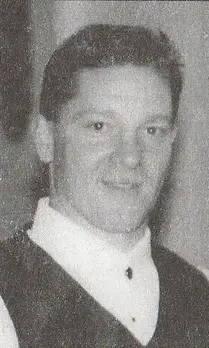
PA State Inductees
The Pennsylvania Sports Hall of Fame Inc.
1629 Augusta Drive
Pittsburgh, PA 15237
412-779-8664
Chapters: Northern, Central, Eastern & Western

1982-1986
Mount Carmel Area HS
2011-2014
Georgia Tech
It’s not often that a visiting player hears any cheers when he hits a home run against the Philadelphia Phillies.
However, the Montreal Expos’ Frank Bolick certainly made some fans in Veterans Stadium happy when he hit a home run off Curt Schilling on May 20, 1993.
“Everyone remembers the three-run homer I hit off Schilling in the Vet,” Bolick said. “It was a Thursday night, and a lot of family and friends were down to see it.”
That fourth-inning home run brought the Expos to within one run of the Phillies, who would eventually go on to win that game and reach the World Series that year. Philadelphia finished three games ahead Bolick’s Expos in the NL East standings.
That was just one of many highlights Bolick, a Mount Carmel graduate, had in his 15 years of playing professional baseball.
Tonight, Bolick will be one of 13 people inducted into the Pennsylvania Sports Hall of Fame.
“It’s exciting,” Bolick said. “I’ve been done playing for a long time. There are some big-name guys going in. I was kind of surprised to be going in.”
Among those also being inducted tonight are former Penn State and NFL player Matt Millen; Super Bowl winner Russ Grimm, who played offensive line for Washington; former MLB player and manager Art Howe; C. Vivian Stringer, who coached three women’s basketball programs to the Final Four; and legendary Bloomsburg University coach Janet Hutchinson, who led the Huskies to 16 field hockey national titles and one softball national championship.
Bolick — a 2004 inductee into the Ed Romance Chapter of the Pa. Sports Hal of Fame — became the second Mount Carmel graduate to appear in a Major League Baseball game when he started for the Expos at third base on Opening Day 1993 against the Cincinnati Reds. Joseph B. Young pitched two innings in 1892 as the first Mount Carmel graduate to play in the majors.
“It was awesome,” Bolick said. “We were in Cincinnati. It was 52 degrees and drizzling rain. I didn’t even have long sleeves I was so pumped up.
“What I remember most about that first game was I faced Jose Rijo my first three at-bats. My fourth at-bat was against Rob Dibble, who was throwing 98. He was throwing 98 and didn’t know where it was going, so it was a little scary.”
While Bolick was certainly talented, he worked to achieve his dream of being a baseball player.
2007-2010
Montreal Expos
“I practiced all the time,” Bolick said. “As a kid, I played all the time. I talked to my high school coach and I would stay extra all the time. I would hit and hit and hit and hit.”
He then starred at Georgia Tech, making an immediate impact.
“At Georgia Tech — I was a freshman All-American — I played well off the bat,” Bolick said.
Bolick set an ACC record for walks with 72 and set the Georgia Tech record for home runs by a freshman with 16 during his first season with the Yellow Jackets.
After being drafted by the Milwaukee Brewers in 1987, Bolick worked his way up the minor leagues. He hit 27 home runs across double-A and triple-A for the Seattle Mariners’ affiliates in 1992.
“They said they needed me as insurance in case Edgar Martinez gets hurt. I said, ‘That’s not helping me,’” Bolick said.
He got his chance when the Mariners traded him to Montreal — the team that drafted him out of high school, but he went to Georgia Tech instead of signing — ahead of the 1993 season.
Again Bolick immediately produced when he got an opportunity. In his second game as a Major Leaguer, he doubled in a two-hit game, and hit in 11 of his first 17 games.
His first home run came in his 14th game when he hit a two-run shot off Steve Wilson in a game at Dodger Stadium.
“I wanted to get that out of the way,” Bolick said. “I figured I would hit it left-handed because (manager) Felipe (Alou) mostly used me to bat left-handed. I don’t know why I was playing that day, hitting right-handed off that pitcher.”
Some of his older teammates dampened his enthusiasm a bit, after they all celebrated his bomb to left field.
“I got back to the dugout and some of the older guys told me you don’t usually get the ball back when you hit a home run as a visitor,” Bolick said. “I hit it over the walkway, 15-20 rows up. I was a little disappointed.”
But, as soon as the game was over, a security guard yelled over to Bolick that a fan had his home run ball. Bolick traded some autographs and his hat for that ball, which he still has in a case.
However, a decision outside of Bolick’s control sank some of his momentum later in the season.
“I was hitting .301 and playing three or four times a week,” Bolick said. “Their No. 1 pick from a year or two before, Greg Colbrunn, came back from elbow surgery, and they put him at first. So my playing time got cut.”
Playing third or first base and consistently hitting in the top half of a lineup that included Marquis Grissom, Delino DeShields and Moises Alou was an easier role for Bolick to be comfortable in than his role after Colbrunn returned — that of a good bat off the bench.
“My timing got all messed up,” Bolick said. “It’s tough being a pinch hitter in the big leagues.”
Bolick ended up hitting .211 with four home runs and 24 RBIs while appearing in 95 games for the Expos that season. But he was granted free agency after the season and spent four more years in the minors.
“It was really tough,” Bolick said. “I had a chip on my shoulder. I think that’s why I made it back. I knew I could hit. I just needed the opportunity to play everyday.”
Bolick continued to rake and hit with power in the minor leagues, and he said he didn’t think about giving up the sport during that time.
" I knew I would have more opportunities,” Bolick said. “I knew somebody would want me because I could hit.”
He made it back to the majors in 1998 with the Anaheim Angels, getting 56 plate appearances in 21 games.
After his stint with the Angels, the Chiba Lotte Marines from Japan came calling.
“I said, ‘Am I going to play everyday?’” Bolick said. “They said, ‘Yes,’ so I said, ‘OK.’”
Bolick became the fifth foreign player to homer in his first at-bat in the Japanese major leagues.
“That was kind of insane,” Bolick said. “It was almost like a storybook.”
However, getting to that “storybook” moment was not exactly straightforward.
“I struggled when I first got there,” Bolick said. “I couldn’t hit the forkball for anything.”
So the Marines sent Bolick to the minors for about two weeks.
“I changed my stance and figured something out,” Bolick said.
The Marines called him up and Bolick’s interpreter said the plan was for Bolick to just watch for a game or two to get a sense of the highest level of professional baseball in Japan. That’s not exactly what happened, though.
“I was at the end of the dugout and I wasn’t even paying attention,” Bolick said. “The interpreter called down, ‘Hey Bo, they want you to hit now.’ I didn’t even have my spikes on. I had to quick put on my shoes and warm up a little.”
Soon, Bolick was racking up hits and home runs in Japan, and was named to the All-Star team in 2000.
“It’s awesome over there,” Bolick said. “If you hit and play well, they love you.”
Away from the field, things weren’t easy at first. Bolick said his first year in Japan, he basically went to his apartment, the train station and the ballpark, and nowhere else.
